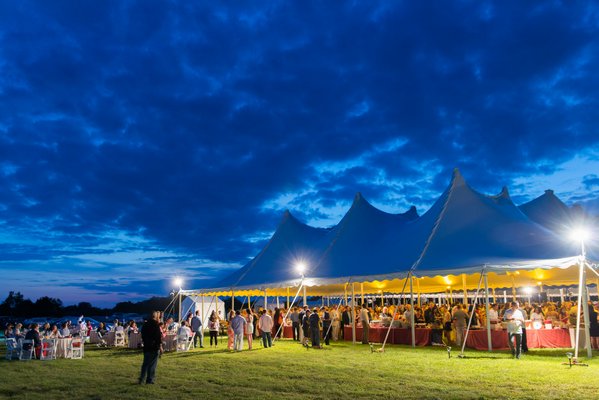
More than 40 chefs from across the country, hours of food tastings and one sprawling white tent in the heart of Wölffer Estate Vineyard—this is Chefs & Champagne.This year, the James Beard Foundation’s annual foodie extravaganza will honor chef, author and restaurateur James Besh, nationally known for his Southern cooking in his native Louisiana. On Saturday, July 23, he will joins the ranks of Martha Stewart, Emeril Lagasse and Bobby Flay, to name a few honorees of the nonprofit culinary arts foundation.
“I was thrilled to hear of this honor from Susan Ungaro,” he said of the James Beard Foundation president during a recent email interview. “Knowing the past recipients and their pedigree, it was quite humbling to be included among those that I’ve held in such high esteem over the years.”
The Southampton Press caught up with Mr. Besh in a rare moment of calm during the chef’s busy summer, and chatted about all things food, and the recovery following Hurricane Katrina.
The Southampton Press: Have you ever been to the Hamptons?
John Besh: I have never been to the Hamptons and so, as you can imagine, I am anxiously awaiting my visit. We’re renting a house and making a long weekend of enjoying the company of our dear friends outside of the heat and humidity of NOLA.
Tell me about growing up in southern Louisiana. What was the culture and food like?
Growing up on the same bayou that I still live today taught me so much about food and cooking. If I caught a redfish, Mom and I would turn it into a court bouillon, or if I caught a speckled trout, it would be dusted in flour and sautéed, becoming trout meunière. It’s one of the only indigenous food cultures left in America with its roots steeped in African, French, Spanish, Italian and German traditions.
When did you realize you had an interest in cooking?
[I was] 11 years old when I had the chance to meet Paul Prudhomme. He inspired me to follow my passion for food and to use food to make a difference. My first dish was shrimp creole. It was great and I also remember how happy it made my father, and that feeling never left me. Food equals happy!
Why did you decide to pursue it professionally?
While in the Marine Corps, serving in and out of combat as an infantry squad leader, I kept diaries of food, recipes, restaurant ideas, and so that pretty much describes where my heart was leading me.
What is your cooking philosophy?
I love to honor those cultures that gave us the cuisine that we have today. I also want to honor the food I cook, by insisting on it being produced sustainably and as locally as possible, and cooking it in a way that manipulates as little as possible.
What was it like breaking into the Southern food scene and opening up your first restaurant? Did you receive any pushback?
I’m Southern through and through, and consequently never thought I was breaking into a scene but rather cooking the foods from my heart in lighter, fresher and contemporary style. I was blessed that it was well received!
How did Hurricane Katrina affect you? How did it affect the culinary scene as a whole?
It changed my life forever, by feeding those that were truly hungry, teaching me that food could not only nourish but, if used properly, I could rebuild and sustain a culture. If purchased responsibly, it could create a huge economic impact, and it allowed us to employ many who had lost all. Food began to mean more than happy. Food became a way to share love.
Thinking we’d surely lose it all, we began feeding folks who were leaving. When folks began to return, we fed them, too. When people began rebuilding restaurants that were destroyed, we fed the workers. Slowly, our restaurant returned and has never been stronger.
What was rebuilding like?
Slow and agonizing, seeing so many lose so much.
What does it take to cook phenomenal New Orleans food? It’s impossible to find good New Orleans food in virtually every other part of the country ...
It’s all about blue crabs, brown and white shrimp, oysters, fish and crawfish. It’s about being close to the food source, which are the salt marsh estuaries that give us these riches.
What is your favorite dish to make?
I eat with the seasons. In the winter it could be gumbo, spring it’s crawfish étouffée, soft shells in the summer and oyster stew in the fall.
Food wise, what is your guilty pleasure?
Too many to list... Guessing a fried oyster po’boy with lots of blue plate mayonnaise, creole tomatoes, lettuce & Tabasco sauce.
Where do you think the future of food is headed?
Not sure other than newer cities will emerge as good food towns. I only hope that as they do we will be able retain our regional identities.
How would you characterize the current climate of the food and restaurant industry?
Good food is becoming more local, sustainable, health conscious, casual—and that’s a good thing. I think that we are on a better path than we were when I started.
Are any of your kids interested in cooking?
They love to cook, but I don’t see any of them following my footsteps. I hope they do discover their passion as I did.
John Besh will be honored at Chefs & Champagne on Saturday, July 23, at 6 p.m. at Wölffer Estate Vineyard in Sagaponack. Tickets are $275, or $200 for James Beard Foundation members. VIP admission begins at 5 p.m. and costs $375. VIP tables for 10 are available for $4,000. For tickets and more information, visit jamesbeard.org/chefsandchampagne.